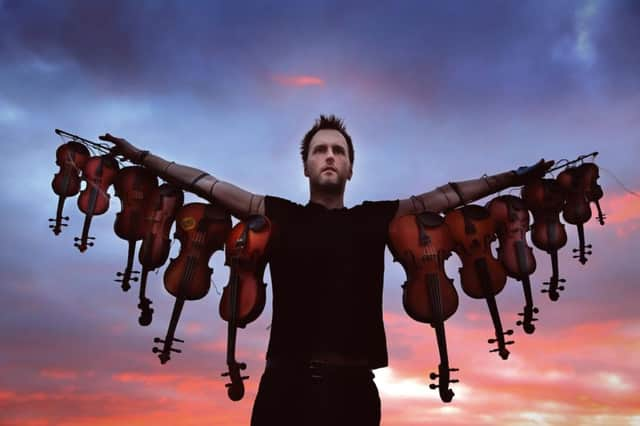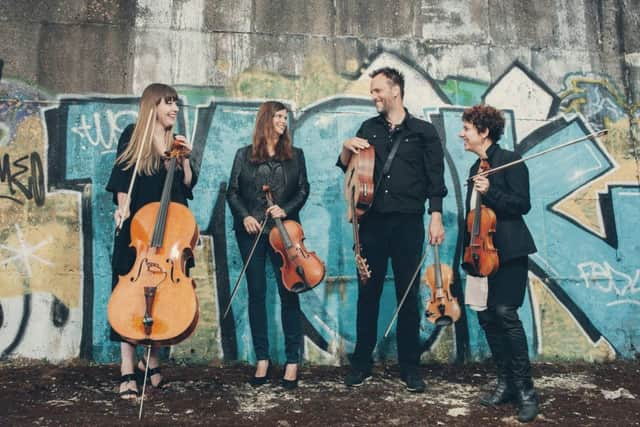Jon Boden: ‘I’ve always been intrigued by the idea of a future that returns to the past’


Eighteen months ago he toured his concept album Afterglow with an exuberant 11-piece band, The Remnant Kings. For his UK dates next month, the Sheffield-based fiddle player, guitarist and singer has decided to strip things down to a quartet who feature Helen Bell on viola, Morven Bryce on violin and Lucy Revis on cello.
Boden, 41, says the idea of a string project occurred to him back in the days of Bellowhead when they would soundcheck the instruments section by section. “In Bellowhead we always said, ‘Oh, we should do with just the strings’, but because of the nature of Bellowhead as an 11-person collective it didn’t feel quite right to go off and do that. But I’ve always liked the idea of just a strings line-up, so I guess it came from that.
Advertisement
Hide AdAdvertisement
Hide Ad“As a string player, I invest those string arrangements with quite a lot of care, but it’s always difficult because you can’t hear everything in a band of that size, you get little snatches one thing and then another, so I again liked the idea of giving the strings and the arrangements that space.”


Purposefully choosing smaller venues this time around, Boden hopes to create a sense of intimacy and concentrate more on the story of Afterglow, which is set in a futuristic, post-oil world and follows two lovers over the course of the night of a city carnival.
“That’s the hope with all of it, really,” he says. “Playing with a big band on stage it is a case that as soon as you’ve got a bass and drums it’s a big sound and it’s very energetic and that sort of storytelling can get slightly sidelined sometimes, there’s no reason why it should, but somehow the expectation with a big band and drums and bass is that maybe people aren’t so tuned in to the story.
“So that more linear texture that you get with strings is hopefully going to be conducive to that kind of storytelling.”
Advertisement
Hide AdAdvertisement
Hide AdBoden’s previous solo album, Songs From The Floodplain, from 2009, also looked to a dystopian future. The musician says he’s inspired by literature. “Children’s books is one of my passions,” he says. “It’s not so much that I’m into science fiction but I am into classic children’s literature and there are quite a few that have that post-apocalyptic, futuristic thing, but it’s actually the non-science fiction element of it that I like.
“For example The Tripod, which is very much a science fiction book, but what I loved about that book is not the big, scary robots, it’s the description of them wandering through the ruins of Paris, and the description of a kind of rural, idyllic lifestyle that starts the story off, the idea that it’s actually set in the future but [they’re living a] feudal, medieval lifestyle. It’s guess I’ve always been intrigued by that side of things, the idea of a future that returns to the past.”
The burnt-orange cityscape featured on the cover of the album is the Steel City that Boden calls home. He says: “I like to think that people can listen to it and set it in whatever city they’re familiar with, but for me it very much is set in Sheffield, that’s where I live and out of the window we look directly down at the hills. That’s very much the idea, someone living outside the city and walking down into it for a street party.”
Boden admits to occasionally musing on how close society might be to the post-apocalyptic situations he describes in Afterglow and Songs From The Floodplains. “Sometimes I think about that sort of regressed future, I wouldn’t necessarily call it dystopian, in a way there’s something vaguely utopian about it because it’s about a simpler existence, although there are obviously dystopian elements to it as well. I suppose my worry is that’s very much the best-case scenario that as a species we learn to live within our means and that probably does mean living a simple existence.
Advertisement
Hide AdAdvertisement
Hide Ad“I was actually asked to play at a science fiction convention last year which was really interesting, I’d never been to anything like that before. They had various talks and one of them was four or five science fiction writers who were also scientists. One of the questions was about futuristic scenarios and one of them said it had been kind of established that the way for the human race to exist would be if you kept the population more or less the same as it is now everyone could live an existence that is equivalent to that of the 1950s in the UK, so it’s not like we are talking about living in mud huts and looking like Stone Age man, it’s potentially quite a civilised way of living but it’s also a lot simpler and a lot lower consumption than we’ve become accustomed to. The difficulty is do we organise ourselves and it doesn’t look like we’re anywhere near being able to do that, but if we don’t then the alternative scenario is far worse and on a depressing day I think that’s where we are heading, but this is a naively optimistic view.”
Having talked of these two albums being part of a trilogy, he says he has “very vague” thoughts of a concluding chapter. “I haven’t got to writing it yet but one of the things that comes through them is, is nature reclaiming manmade landscapes, so I think I might focus more directly on that theme on the third one.”
Boden’s interest in composing for the stage goes back to his sixth-form days in Winchester. Later at Durham University, he befriended Ben Naylor, whose theatre productions he would go on to work on. He has also composed for two Royal Shakespeare Company productions, The Merchant of Venice and A Winter’s Tale.
“When I started off that was very much what I was excited about,” he says. “I actually wanted to do theatre music primarily but performing came along. I very much wanted that variety but that’s become tempered by the fact that it’s difficult to maintain parallel careers. Even though they’re all related, in that they’re all about music, everything works in different time frames.”
Advertisement
Hide AdAdvertisement
Hide AdNonetheless there is still an ambition he’d like to fulfil. “I’d like to write either an opera or a musical, at some point that would be great. Performance wise, I’ve ticked most of the boxes really with Bellowhead. It was interesting moving up the venue sizes. It kind of got to the point where we got bigger than I actually liked; I liked the smaller venues than we were doing. It’s an amazing privilege to play a gig to 1,500 people; once you’ve played to 2,500 people it’s also fantastic but it’s not necessarily better and you’re also aware that a lot of those people are such a long way away from you. We got to see enough of the industry that I don’t feel I need to see anything more of it above where we got to. The next step up for Bellowhead would be to play arenas. We did play a couple of arena-size venues but we all felt it wasn’t actually a step that we were that fussed about making.”
Jon Boden and The Remnant Strings play at the Howard Assembly Room, Leeds on March 1 and Buxton Opera House on March 2. www.jonboden.com